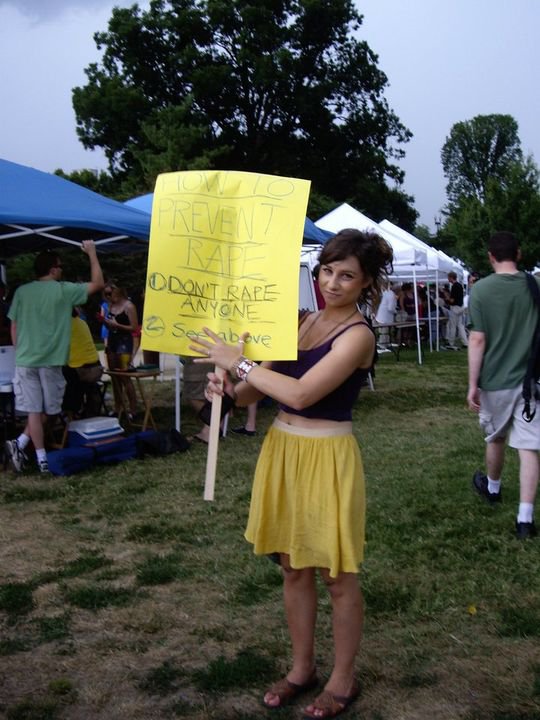How I Became An Anti-Street Harassment Activist
By Renee Davidson

I came to Collective Action for Safe Spaces (CASS) in 2012 because I was sick of street harassment. I had moved to DC after graduating college, and street harassment became less of an infrequent nuisance and more of a daily onslaught. I was street harassed when I was wearing work clothes at the bus stop, and cars full of men would stop and leer. I was street harassed when I was wearing jeans while walking to a friend’s house, and strangers would comment on my “tits” and “pussy.” I was street harassed at the grocery store while buying laundry detergent, at the park while eating my lunch, outside my office while running errands.
Navigating public spaces became scary, exhausting and traumatizing. There was the time I was followed home on foot at night, and I changed my path to try to lose the stranger, keeping a friend on the line and letting her know where I was. There was the other time a car pulled over and followed me as I walked in my neighborhood, until I found a cop a block up who gave me a ride home. Then there was the time a man outside my office building thrust a wad of cash at me, looking me up and down as he asked, “How much?”
Gradually and subconsciously, the public comments on my body began to affect my sense of self. I began to see my body less as a source of empowerment — something that could get me places, perform tasks and serve my needs — and more as a threat, a risk, a vulnerability. Over time, and like many women, I came to see my body as the cause of elicited unwanted sexual attention, the source of public encounters that caused me to feel scared, objectified and unsafe.
So often normalized and dismissed, written off as an annoyance if not a “compliment,” I’m not even sure that I knew that there was a name for street harassment until I found CASS. I’d first stumbled across CASS, likely through local blogs and listservs, back when it was HollaBackDC. CASS taught me about how street harassment is part of the spectrum of violence against women — just one piece of a larger cultural problem surrounding sexual violence, or rape culture. Learning about CASS’s work and reading its blog allowed me to take solace in the realization that I wasn’t alone in experiencing — and feeling affected by and thoroughly fed up with — street harassment.
A lot of things helped me to reclaim my sense of self esteem and self image after it became colored — or more appropriately, stained — by street harassment and rape culture at large. Working with CASS was one of them. Our team — composed of four volunteer staffers who work amid our day jobs — is small but mighty. Since CASS was founded in 2009, we’ve successfully campaigned for DC’s public transit system, WMATA, to implement plans to prevent sexual harassment and assault on public transit, including; 1) implementing PSAs on buses and trains; 2) establishing an online reporting tool; and 3) conducting an all-staff training on responding to incidences of sexual harassment and assault (currently in process). CASS also works with DC Council to promote policies that support survivors, shares stories from the DC community in an effort to illustrate the harmful effects of street harassment and campaigns for businesses and local groups to stop using pro-street harassment marketing. CASS provides support for those who report harassment over Twitter, trains local bars on bystander intervention techniques to prevent sexual harassment and assault, creates empowering street art that sparks dialogue on street harassment, and works to bring safe alternatives to public transportation to DC.
A year and a half ago, I was fed up with street harassment. I still am today — and always will be — but working with CASS has helped to remind me of something incredibly important: that I have agency. I can respond to harassers however I choose — whether it’s by telling them to “respect women,” giving them the finger, or even ignoring them. CASS reminded me that I, too, am a human being: that my feelings and emotions matter, and that I deserve to feel safe in public.
Follow CASS on Facebook and Twitter. You can also donate to support our volunteer-led work in creating safe spaces for all.
MORE FROM “My Streets, Too”:
- The Five Kinds of Street Harassers I Met In Washington D.C. This Weekend, Danielle C. Belton
- I Was Just Molested on the Train and I Didn’t Do Anything to Stop It, Jen Corey
- My Streets, My Body: How street harassment impacts my weight, my eating habits, my health, Dechanique
- Follow-up: On the Reverse “10-5 Rule” and Walking While Female, Liz Gorman
- On the WMATA Anti-Harassment Campaign: Are we any safer than we were?, Allison Elder
- Getting Off the Train, Rosie Cohen
- When in Rome, Courtney Brooks
- Feminism, The Bus Stop, “AKD”
- When Standing Up to Sexual Harassment Makes You a B*tch, Renee Davidson
- It Feels Like This is How it’s Always Going to Be, Nancy Messieh
- On the Reverse “10-5 Rule” and Walking While Female, Liz Gorman
ABOUT “MY STREETS, TOO”
“My Streets, Too” is CASS’s ongoing series on personal writings on street harassment by members of the DC community. Email Renee to submit writings using your full name, initials, or anonymously (just let us know). Please be sure to use the subject line “My Streets, Too.”

